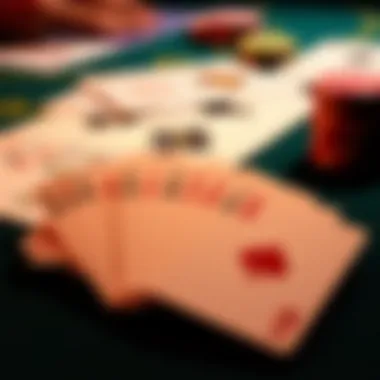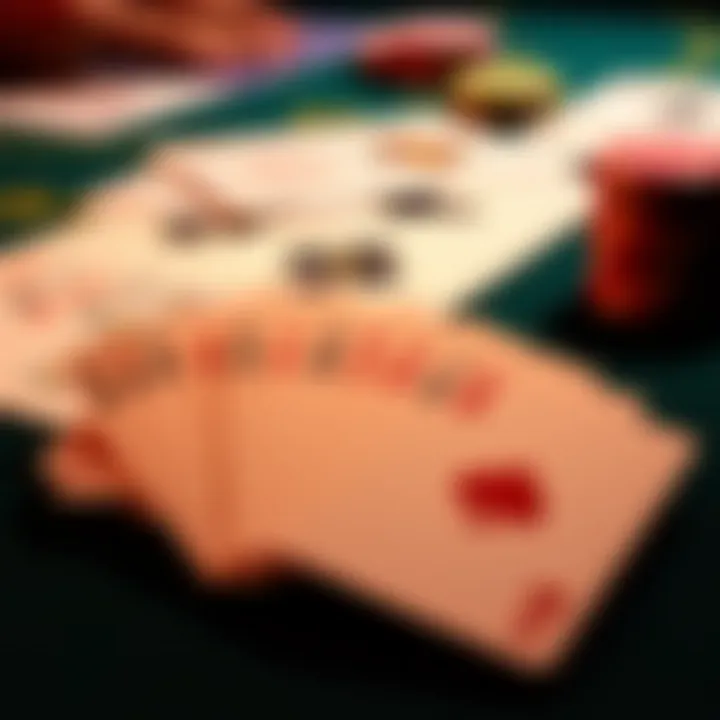Mastering 21: Your Ultimate Guide to the Card Game


Intro
In the world of card games, few games hold the same allure and challenge as 21. This game, often known by its more popular name, Blackjack, has captivated players from all walks of life, from smoky casino lounges to the comfortable settings of home gatherings. At its core, 21 is more than just a game of luck; it encompasses strategy, psychology, and a deep understanding of probabilities. Whether you're just starting out or you're looking to fine-tune your skills, this guide aims to shed light on the fundamental concepts that can elevate your gameplay.
As we navigate through the various facets of 21, it’s essential to comprehend not only how the game functions but also the strategies that can be employed to tip the scales in your favor. From the basic rules to the more intricate betting techniques, each aspect contributes to the overall experience and potential success at the table. With a firm grasp on these components, participants can approach the game confidently, making informed decisions that can lead to better outcomes.
This guide will touch upon key strategies, highlight common pitfalls to be aware of, and provide insights into effective betting practices. Ultimately, by equipping yourself with knowledge, you can enhance not only your skills but also your enjoyment of this timeless game.
Betting Strategies
Betting in 21 is as crucial as knowing the rules. A well-placed bet can mean the difference between a winning hand and a lost stake. There are foundational techniques any player should grasp, alongside advanced betting systems that can offer a competitive edge.
Fundamental Betting Techniques
To get the ball rolling, let's delve into the basic betting strategies that can significantly impact your game.
- Flat Betting: This method involves consistently betting the same amount for each hand. It's straightforward and minimizes risk, perfect for beginners who want to get comfortable with the game’s dynamics.
- Percentage Betting: This technique involves wagering a fixed percentage of your total bankroll. For example, if your bankroll is $100 and you decide to bet 5%, you would place a $5 bet. This strategy can help manage your funds effectively, especially during a losing streak.
- Unit Betting: Another common strategy, this involves using betting units, where you designate a specific amount as a base unit. For instance, if you set a unit of $10, you might increase your stake based on performance—winning or losing.
Advanced Betting Systems
Once you're comfortable with the basics, you might want to explore more advanced betting systems. These strategies can feel a bit like walking a tightrope—holding the potential for greater rewards but also higher risks.
- Martingale System: In this approach, you double your bet after each loss, aiming to recover losses and gain a profit after a win. While it sounds enticing, be cautious. This system requires a vast bankroll and can result in substantial losses if you hit a losing streak.
- Paroli System: This is a positive progression betting system where you increase your bet after a win. The idea is to maximize profits during winning streaks while minimizing losses during losing turns.
"Every game of 21 holds its unique challenges. Knowing where to place your bet can make all the difference."
- Fibonacci System: This strategy is based on the Fibonacci sequence, where you increase your bet according to the progression of numbers after a loss. It aims to cover all previous losses.
While advanced systems can offer dramatic swings in your overall gains, they require a strong understanding of risk management. It is essential to keep emotions in check and stick to your strategy to avoid unwise decisions during gameplay.
For deeper insights into strategies, feel free to check resources like Wikipedia, Britannica, or community discussions on Reddit. Familiarizing yourself with varied perspectives might provide you with new strategies or ideas you hadn't considered before.
As you develop your skills and enhance your strategies, the beauty of 21 will unfold—its simplicity coupled with layers of complexity, making each game a new journey. Remember, the key to mastery is continuous learning and adaptation.
Prelims to
The card game 21, popularly known as blackjack, holds a significant place in the realm of gambling. Not only does it offer players the thrill of chance, but it also requires a blend of skill and strategy. Understanding the fundamentals of 21 is crucial for anyone wanting to excel, whether you're just starting out or have been tossing cards for years.
The beauty of 21 resides in its simplicity yet layered complexity. The objective is straightforward: get as close to 21 without going over, while also beating the dealer. However, the nuances of gameplay can be labyrinthine, especially when one considers the various strategies that seasoned players employ to tilt the odds in their favor.
In this section, we will embark on a journey exploring the essence of the game. Knowing the basic setup, recognizing the game's history, and understanding how it has evolved over the years can enrich a player's experience and strategic approach. As the old saying goes, "Knowledge is power." Such wisdom is particularly true in the world of gambling.
Overview of the Game
21 is often regarded as the quintessential card game played in casinos around the world. Players are dealt two cards and aim to form a hand that totals as close to 21 as possible without exceeding that number. What sets it apart from other card games is the interaction between the player and the dealer, creating a dynamic where timing and decision-making become pivotal.
The gameplay is typically swift, shipping the card action along at a brisk pace that can keep everyone on their toes. Players can choose to hit, stand, double down, or even split their cards, leading to a rich tapestry of potential outcomes with every hand. Each decision presents its own risks and rewards, which is where strategy comes into play.
A key aspect that engages players is the blend of luck and skill. Every deal can be a chance for victory or a slip into defeat, making every session a unique cocktail of emotions. Thus, grasping the game itself and its components is essential for any aspiring player.
Historical Context and Evolution
Tracing the roots of 21 reveals a game steeped in history, with origins that pulse through various cultures and eras. The journey of 21 likely began in Europe in the 17th century, evolving from earlier games such as Veintiuna from Spain and Lanterloo from England. These historical predecessors laid the groundwork for what we eventually came to know as blackjack.
Over the decades, the game made its way across the Atlantic, gaining prominence in America during the early 20th century. The boom of casinos and organized gambling solidified its status as a staple. It underwent nomenclatural shifts—what started as 21 morphed into blackjack, particularly when casinos began offering bonuses for hitting 21 with a blackjack hand, which consists of an ace paired with a ten-valued card.
Today, 21 has burgeoned into various iterations and styles played in diverse settings, from Las Vegas strip hotels to local pubs. It embodies changing trends within the gaming world, adapting through time while retaining a core of straightforward excitement.
Understanding the historical context enriches the game's appeal, as players don't just engage with the cards in their hands but are also stepping into a long legacy of social and cultural gameplay.
Game Components
Understanding the components of the game is crucial for anyone looking to improve their skills in 21. The equipment you use and the values of the cards not only determine how the game is played, but also how strategies are formed and executed. A thorough grasp of these elements can significantly enhance a player's experience.
Required Equipment
To participate effectively in 21, you need a few essential components:
- Deck of Cards: A standard 52-card deck is used. Each card holds a specific value, and recognizing these values quickly can give you a sharp edge.
- Chips or Money: For betting purposes, you will need chips or cash. Ensure you have enough to cover your bets, as the game relies heavily on staking.
- Table: While playing at home, any flat surface will do, but in casinos, there's usually a designated table for 21. These tables often have markings that help players keep track of bets and cards.
Moreover, if you’re diving into online gaming, ensure that your software is reputable and user-friendly. Websites like Reddit discuss various platforms that cater to online players, helping you select the right one for your style.


Considerations: When acquiring equipment, prioritize quality over quantity. For instance, if you're investing in chips, heavier ones feel better in hand and can enhance your game experience. You can often find these at local card shops or even online.
Card Values Explained
In 21, understanding card values is not just a trivial detail; it's a fundamental aspect that could spell the difference between winning and losing.
- Cards 2 through 10 are worth their face values.
- Kings, Queens, and Jacks, are worth 10 points each.
- Aces are versatile, valued at either 1 or 11 points, depending on what benefits your hand.
Knowing how to combine these values is key. For instance:
- A soft hand: This is when an Ace is valued as 11, allowing you to push the total above 21 without busting if another card goes up. For example, having Ace and 7 gives you a soft 18.
- A hard hand: This is when all cards count for their face value. For instance, a hand of 10 and 8 is considered a hard 18.
"When it comes to 21, understanding the difference between soft and hard hands is pivotal for making informed decisions at the table."
Practical Application: During gameplay, quickly assessing your hand and the dealer's visible card can guide your strategies. For example, if you have an Ace and 6 (soft 17) against the dealer's 6, basic strategy suggests hitting, as the dealer's card is known to be a weak one.
By properly grasping these components, players can navigate the intricacies of 21 more successfully, allowing for a more strategic approach rather than relying solely on luck. Understanding both equipment and card values is the first step in becoming a proficient player.
Basic Rules of
Understanding the basic rules of 21 is essential for anyone looking to dive into this game, whether you're a novice or a seasoned player. Knowing these rules sets the stage for effective strategy development and allows players to engage more thoughtfully with the game. With all the variations and nuances that exist within gameplay, having a solid grasp of the foundational rules provides clarity and confidence while at the table.
Objective of the Game
At its core, the objective of 21 is simple: to beat the dealer without exceeding a total of 21 points. The game revolves around accumulating card values that add up as closely to 21 as possible. The simplicity of this goal masks the complex strategies and psychological elements that come into play once you've shuffled your first deck.
- Players aim to achieve a higher score than the dealer but must tread carefully to avoid busting, which occurs when the player's total exceeds 21. A busted hand results in an automatic loss, making it a crucial consideration when deciding whether to hit or stand.
- In 21, Aces can be worth either 1 or 11, depending on what serves the player’s hand best. This flexibility is one of the game's strategic advantages but can also lead to miscalculations if you’re not paying attention.
Gameplay Sequence
The gameplay of 21 progresses in a structured way, allowing each player an opportunity to act in turn. Here’s a basic flow of how a typical round unfolds:
- Dealing Cards: Each player, including the dealer, is dealt two cards. Players often get two face-up cards, while the dealer typically has one card face up and one face down.
- Player Decisions: Once the cards are dealt, players evaluate their hands. They can choose to:
- Dealer's Turn: After all players have acted, it’s the dealer’s turn. The dealer must hit until their total is 17 or higher. Specific house rules may vary on whether the dealer hits on a soft 17, which must be understood by players to strategize effectively.
- Showdown: Finally, once the dealer stands, all hands are compared. If a player’s total is higher than the dealer’s without busting, that player wins.
- Hit: Draw one more card in an effort to get closer to 21.
- Stand: Keep their current hand and pass the turn.
- Double Down: Double their original bet and receive only one additional card.
- Split: If a player holds a pair, they may split them into two separate hands.
Winning Conditions
Winning in 21 isn’t just about getting the highest score but finding ways to effectively counter the dealer's hand. Here’s what it takes:
- Natural 21: If a player is dealt an Ace and a ten-value card (10, Jack, Queen, or King), they have a natural 21. This usually beats all other hands unless the dealer has the same.
- Higher Total: To win, a player must have a total higher than the dealer's hand without going over 21. Simple as it may sound, it requires a keen understanding of probabilities and risk assessment to determine your best course of action.
- Push: In some cases, if both the player and dealer have the same total, it results in a push. No one wins or loses; the player's bet is returned.
In essence, mastering the basic rules of 21 is the first step towards becoming a competent player. Recognizing how to navigate the objective, the sequence of play, and the conditions to win allows players to refine their strategies and elevate their experience at the game table.
Strategies for Playing
Mastering the game of 21 goes beyond just knowing the rules or holding onto a lucky charm. Strategies make all the difference—whether you are a novice just dipping your toes or a seasoned pro looking to refine your game. Here, we’ll dissect various strategies that can give you an edge at the table, helping you to maximize your chances of walking away a winner.
Basic Strategy Overview
Basic strategy in 21 acts as a foundational framework that outlines the optimal way to play each hand based on mathematical probabilities. It takes into consideration the player's total and the dealer's upcard, mapping out a path of decision-making. By following this strategy, you can significantly lower the house edge. Most versions of basic strategy charts are simple to memorize, advising when to hit, stand, double down, or split pairs.
A straightforward example is if your hand sums to 12 and the dealer shows a 4. According to basic strategy, you should stand. The rationale is that the dealer might bust since they have to hit on 16 or less.
Key Takeaway: The more you rely on this strategy rather than chance, the better your odds.
Advanced Strategies
For the more experienced players, advanced strategies delve deeper into the subtleties of the game, including aspects like card counting and understanding dealer behavior. These techniques require commitment, practice, and a level of risk management tailored to your personal playing style.
Card Counting Techniques
Card counting, by its nature, isn’t just a way to keep track of cards—it's an entire mindset. Players utilize this technique to gain insight into the remaining high and low cards in the deck, which influences their betting strategy. One of the most recognized systems is the Hi-Lo method, where the player assigns points to cards: +1 for low cards (2-6), 0 for middle cards (7-9), and -1 for high cards (10-A). Keeping a running count of these values allows the player to estimate the ratio of high to low cards still in play.
The key characteristic of card counting is its ability to shift your bets based on the count. When the count is high (meaning more high cards remain), players can increase their bets, capitalizing on the higher win potential. The downside? It can be mentally taxing and requires a great deal of focus, not to mention that casinos keep a close eye on counters.
Advantage: Card counting can turn the tables, allowing for greater control over bets.
Understanding Dealer Behavior
Deciphering how the dealer plays their hand can provide crucial insights that are often overlooked. Each dealer has their own rhythm, and seasoned players learn to read those cues. For instance, if a dealer consistently hesitates when showing a bust card, it may signal their uncertainty, allowing more experienced players to bet aggressively on that round.
The essence of this strategy lies in being observant and adaptable. Players pay attention not only to the value of the dealer's upcard but also to their mannerisms over several hands. This can provide better insight into the probability of them busting or standing with a strong hand.


Unique Feature: While understanding dealer behavior is subjective, it can offer a significant edge when combined with other strategies.
In summary, while the basic strategy provides a solid foundation, expanding into advanced techniques enables players to hone their skills, adapt to numerous situations, and ultimately improve their game results. Whether you’re adopting card counting or perfecting your dealer observations, employing these strategies is crucial if you aim to take your play from average to exceptional.
Variations of
The world of 21 is not just a simple game with a single set of rules; it is rich with variations that cater to different regional preferences and players’ tastes. Understanding these variations enhances not only your gameplay but also your enjoyment of the game itself. Each variant holds unique elements that can significantly impact strategy, betting practices, and overall experience. For those looking to refine their skills or just delve deeper into the game, exploring the variations of 21 opens up a new realm of possibilities, and offers different challenges.
Different Regional Rules
Regional rules can make or break a player’s strategy in 21. These rules often differ based on local customs or legal frameworks governing gambling. For instance, in some casinos in Las Vegas, players are allowed to double down after splitting pairs, while in other places, such as parts of Europe, this option may be restricted.
Additionally, the dealer's rules on hitting or standing can vary, impacting the player’s decision-making. In particular, a rule where dealers must hit on soft 17 can shift the odds slightly, favoring the house. This variety not only adds excitement to the game but also challenges players to adapt their strategies.
One vital aspect to keep in mind is that, before sitting at the table, players should always confirm the specific house rules. This ensures that there are no surprises during a game, allowing for a more streamlined playing experience.
Popular Variants
There are two notable variants of the game of 21 that have gained popularity in different circles. These variants not only enhance the traditional gameplay but introduce concepts and rules that can challenge even seasoned players.
Spanish
Spanish 21 is a variant that uses a unique deck composition—namely, it omits 10s but maintains all other cards. This missing 10 introduces a significant twist to the game. One of the key characteristics of Spanish 21 is the increased payouts: for instance, players can receive 2:1 for a natural 21, making the stakes more thrilling.
A notable advantage of this version is how it allows players to make additional moves after a split, further increasing opportunities for strategy and earnings. However, the omission of the 10s can make getting to 21 a tad more tricky, and one must be careful not to underestimate this challenge.
The unique feature here emphasizes strategizing around fewer high-value cards, which has implications on betting strategies and decision-making. Spanish 21 appeals to players who are looking for a high-octane experience with potentially higher payouts, making it a popular choice in various gambling spots.
Blackjack Switch
Another engaging variant is Blackjack Switch, which brings a different flavor to the game. Players in this version are dealt two hands and have the exciting option to switch the second cards between those hands. This aspect introduces levels of tactical decision-making like no other, offering players a chance to improve their hands significantly.
The main advantage here is flexibility. Players can adapt their strategies in real-time, which can greatly affect the outcome of each round. However, this variant also includes a unique twist, where the dealer wins all ties, which can pique the betting stakes quite a bit.
For those adept at playing with multiple hands and capable of quickly assessing the dynamics, Blackjack Switch can be incredibly rewarding. The strategic depth it adds makes it a must-try for any player eager to push their skills to the next level while enjoying the thrill of the game.
Betting Mechanics in
Understanding the betting mechanics in 21 is crucial for anyone who wants to dive deep into the game. Wagering not only affects potential gains but also shapes the overall strategy and player interaction at the table. It incorporates elements like risk assessment, probability, and the psychological dance between players and dealers. Gaining a firm grasp on betting can even up the ante in your gameplay.
Understanding Wagers
Wagers in 21 serve as the vehicle through which all players participate in the game. Each bet determines how much a player stands to win—or lose—during their turn.
When initiating a bet, players must consider several critical factors:
- Table Limits: Each table has a minimum and maximum that players can wager. Understanding these limits is essential to avoid mishaps that could drain your bankroll.
- Position at the Table: Your position relative to the dealer and other players can influence your betting decisions. For example, remaining in later positions might provide insight into other players’ strategies before you make a bet.
- Bankroll Management: Setting aside a specific amount for betting helps maintain control of your finances during play. It’s important to decide in advance how much you are willing to risk, even before the cards are dealt.
Players often falter when they underestimate the impact of their wagers, so it’s a good practice to familiarize yourself with the mechanics of betting before diving in.
Payout Structures
The payout structures in 21 can significantly influence your approach to the game. Understanding how much each wager can return is vital for strategic betting and overall navigation of the game.
Here are the common payout structures that players should take note of:
- Standard Payout: The most common payout is 1:1 for winning bets, enticing players to wager a substantial amount in hopes of breaking even or turning a profit.
- Blackjack Payout: If a player gets a total of 21 with the first two cards dealt, this typically yields a payout of 3:2. It’s one of the rare instances where risk can produce a greater reward.
- Insurance Bets: When the dealer shows an Ace,players can place an insurance bet. This pays out 2:1 if the dealer has a blackjack, thus presenting a way for players to hedge against risk.
These payout structures not only dictate how much players might win but also introduce elements of strategy—decisions around whether to place side bets, for instance, may lead to hefty rewards, albeit with their risks. Understanding these payout structures empowers players to make more informed decisions.
"In betting, knowledge is power. Understanding the underlying mechanics can mean the difference between risk and reward."
By comprehending the nuances of wagers and payout structures, players can engage more fully with 21, allowing their strategic foundations to flourish. Whether you’re a newcomer or an experienced player, mastering these concepts will enhance your gameplay and potentially your wins.
Psychological Aspects of the Game
Understanding the psychological aspects of playing 21 is critical for both the novice and seasoned player. The mental game can make or break your overall performance, influencing your decisions and strategies. In a card game where numerical values clash and every move counts, the mind is both your greatest ally and your fiercest enemy. This section explores two main components: reading other players and managing emotions.
Reading Other Players
Reading your opponents is an art that goes beyond mere observation. It’s about deciphering their habits, body language, and betting patterns. Just like a lion stalking its prey, players need to be attentive, analyzing subtle cues that could indicate whether an opponent is bluffing or holding a strong hand.
Here are a few key aspects to consider when observing your fellow players:


- Facial Expressions: A raised eyebrow, a tight smile, or a furrowed brow can all signal different emotions and intentions. Pay attention to the shifts in demeanor when hands are dealt.
- Body Language: Is a player leaning in closer to the table or pulling back? Each posture might reveal confidence or uncertainty, providing clues about their likely strategy.
- Betting Patterns: Noticing common behaviors in betting can be crucial. Frequent large bets might indicate a player who's confident, while erratic betting could suggest they are flustered or unsure.
"The key to winning lies not just in the cards you hold but in how well you can read the room."
Recognizing these signals can give you the upper hand. Remember, it's not just a game of cards; it's a game of people, too.
Managing Emotion
Emotional control is essential. Keeping a clear head ensures that you're making decisions based on strategy and not reaction. A hasty move influenced by frustration or excitement can lead to poor choices. Here’s how to maintain emotional equilibrium during gameplay:
- Take Breaks: If you find yourself feeling agitated or anxious, step away for a moment. A brief pause can provide clarity and help you regroup.
- Establish a Routine: Developing a consistent approach to each game can provide a sense of control. Whether it's how you shuffle your cards or how you think through your bets, routines can ground you.
- Recognize Triggers: Identify what makes you the most anxious. Maybe it’s a specific player or a sequence of bad hands. Acknowledging these triggers can help you prepare mentally.
In summary, mastering the psychological components of 21 is as important as understanding its rules. Observing others closely and managing your emotional responses can lead to smarter decisions and, ultimately, more successful gaming experiences.
Common Mistakes to Avoid
In the world of 21, steering clear of common pitfalls can be just as crucial as mastering the rules. Understanding these mistakes not only enhances your gameplay but can also significantly affect your overall success and enjoyment of the game. For gamblers and strategists alike, recognizing and dodging these traps can be the difference between merely playing and truly competing.
Misunderstanding Card Values
One of the primary blunders many players make is misinterpreting card values. At first glance, it may seem simple: cards 2 to 10 are worth their face value, while face cards (Jack, Queen, King) carry a value of 10. However, the value of an Ace is where confusion often creeps in. The Ace can be either 1 or 11, depending on what best serves your hand in a given moment.
It’s easy to see how a rookie, perhaps too eager to hit the jackpot, might mistakenly count an Ace as 11 without considering the whole hand. Imagine holding an Ace and a 6. Counting this as 17 seems reasonable, but maybe you’re dealt a 4 next. Now you bust—an preventable mistake!
- Tip: Always take a moment to reassess your hand's total when involved in play; it can make all the difference.
Poor Betting Decisions
Next on the list are poor betting decisions, which can arise from a lack of understanding about game dynamics or from emotional responses during play. Many players tend to either overbet to chase losses or panic and retreat too soon, sometimes even during a winning streak. The stakes can alter behavior substantially, making it easy to lose sight of strategy in favor of feeling.
- Contextual Awareness: Recognizing when emotions are at play is key. Consider the lengths to which you’re willing to go—irrespective of your standings in the game. For instance, jumping up to high-stakes betting after a couple of wins could put you in a tight spot quickly.
Instead of making large, hasty bets, aim for a betting strategy solidly grounded in understanding probabilities and tables. This will not only help maintain control but, more importantly, afford room to weather the ups and downs of the game.
"Winning isn’t about luck; it’s about playing smart and knowing when to hold 'em and when to fold 'em."
The Role of Luck vs. Skill
When it comes to the card game of 21, many enthusiasts often debate the eternal question: is it more about luck or skill? This topic is crucial for anyone looking to master the game, as understanding the balance between these two elements can significantly impact your overall strategy and success.
Understanding Game Dynamics
The dynamics of 21 present a unique blend of both luck and skill. On one hand, the draw of the cards is a matter of chance. You can't control what cards you receive; that part is dictated by the shuffle of the deck. Yet, the real artistry lies in how you respond to that luck.
- Card Counting: A savvy player can track cards that have already been played, giving them insight into what remains in the deck. This skill allows players to adjust their strategy depending on the probabilities of potential winning hands.
- Player Decision-Making: Your choices—whether to hit, stand, or double down—showcase your skill level. Correct decisions can turn random luck into a victory, whereas poor choices can squander a favorable draw.
In essence, while luck deals the cards, skill plays them. It's a delicate dance of statistical awareness and psychological intuition.
Long-term vs. Short-term Outcomes
The distinction between long-term and short-term outcomes in 21 showcases the varying roles of luck and skill over time.
In the short term, you'll often experience swings in your fortune that can feel like a rollercoaster ride. A series of bad cards might lead to frustrating losses no matter how skilled you are at playing. Conversely, a stroke of luck with a particularly good hand can lead to a sudden win, reinforcing the idea that chance plays a significant role.
This is why many beginners often mistake luck for skill. They may find themselves winning a few games consecutively due to favorable draws, gaining an illusion of mastery over the game. However, in the long-term, skill triumphs. A well-developed strategy—balancing safe plays with calculated risks—will likely yield better results.
"Over time, the outcomes of 21 reflect the true skills of the players involved more than mere luck ever could."
The longer you play, the more you'll notice patterns and trends, effectively reducing the impact of luck and allowing skill to shine through. This is the crux of becoming not just a participant, but a master strategist.
For more on player strategies and detailed insights, check out these resources on Wikipedia and Britannica.
Practicing consistently will help refine your skills and improve your understanding of how best to harness the elements of chance involved in 21.
The End
The final section of this article ties together the various strands of information provided throughout. Understanding the nuances of 21 is crucial not just as a card game but also as a reflection of strategy, psychology, and even chance. It's not merely about the cards dealt; it's about how those cards are played. One of the key elements in mastering 21 is recognizing that each hand offers an opportunity to learn, adapt and improve one's skills.
Important elements to consider:
- Mastering Fundamentals: The importance of a strong grasp on the basic rules cannot be emphasized enough. Without this foundation, the challenge in implementing strategies becomes formidable.
- Evolution of Strategy: Players should continuously update their understanding of strategies as game dynamics and player behaviors change. Relying on outdated tactics can lead to unwise decisions.
- Psychological Insights: Delving into the psychological aspects of the game helps in reading opponents and managing one’s own emotions, which can significantly impact decision-making.
- Commitment to Practice: Like with any skill, practice is the path to improvement. Players who invest time in honing their skills are far more likely to reap rewards at the table.
With these takeaways, seasoned players can reinforce their strategies, while novices can build a solid groundwork for enjoyable experiences moving forward.
Summarizing Key Takeaways
- Understanding the Flow: Each round in 21 is a microcosm of broader gaming strategies. Players must adapt to the flow of the game, shifting from risk-taking to conservative play as circumstances dictate.
- Importance of Strategy: Using strategies such as card counting, recognizing trends, and adjusting to dealer behavior can influence outcomes significantly.
- Emotional Composure: Maintaining composure throughout the highs and lows is integral to performing well. The mental aspect is as critical as the tactical side.
- Endless Learning: There’s always new information and strategies to learn. Engaging with community resources, such as forums and gambling literature, can keep players on their toes.
Final Thoughts on Playing
In sum, playing 21 is more than just the luck of the draw. It combines an understanding of rules, strategic insight, psychological awareness, and a commitment to continuous learning. Those willing to delve deeply into each of these aspects will not only improve their gameplay but also enjoy the process. This article aimed to shed light on these complexities and serve as a resource for anyone looking to enhance their experience in 21. The game invites players into a world where calculated risks and thoughtful strategies intertwine, making each session a blend of skill and serendipity.















